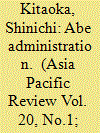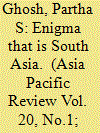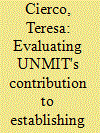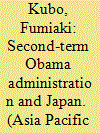|
|
|
Sort Order |
|
|
|
Items / Page
|
|
|
|
|
|
|
| Srl | Item |
| 1 |
ID:
120176


|
|
|
|
|
| Publication |
2013.
|
| Summary/Abstract |
The second Abe administration, inaugurated on December 26, 2012, has been called a repudiation of the Democratic Party of Japan (DPJ) rather than a strong endorsement of the Liberal Democratic Party (LDP). However, in the intervening months, public support has risen. Going forward, the Abe administration faces three serious challenges, namely the economy, security and foreign policy, and a strategy to win in the Upper House elections expected in July 2013. This article analyzes each of these challenges and explores possible courses that the administration could take.
|
|
|
|
|
|
|
|
|
|
|
|
|
|
|
|
| 2 |
ID:
120183


|
|
|
|
|
| Publication |
2013.
|
| Summary/Abstract |
The South Asian Association for Regional Cooperation (SAARC) is now 28 years old, yet its success is nominal. That more important bilateral issues are discussed on the sidelines of SAARC Summits proves the point. Intra-regional trade is still miniscule compared to the region's overall share in the world trade. The biggest defaulter is India, the most prominent member of the group. The purpose of this paper is first to raise the question whether South Asia qualifies to be called a region, and second to argue that, given the problems it faces with most of its neighbours, India is forced to conclude that SAARC matters the least for it. For economic and strategic reasons, India's interests lie in global networking and in a balanced relationship with China. Since Chinese military, diplomatic, and economic presence in South Asia poaches into India's perceived sphere of influence, India's interest in SAARC is limited to that context for otherwise it neither provides large markets for India nor does it contribute to India's strategic policy. Inversely, such a situation justifies India's neighbours playing the China card to bargain with India though that card its losing its value. To buttress our arguments we have drawn from the region's historical experiences as well as from recent developments in international and South Asian politics, including domestic politics.
|
|
|
|
|
|
|
|
|
|
|
|
|
|
|
|
| 3 |
ID:
120182


|
|
|
|
|
| Publication |
2013.
|
| Summary/Abstract |
Timor-Leste began the democratic transformation process in the beginning of this century with a heavy past legacy of external domination. Since then, it has been experiencing many difficulties in its path towards democracy especially in what concerns one critical issue: the respect for the rule of law. Focusing on two important pillars of the rule of law-justice and security-this paper seeks to understand why has been so difficult to establish the rule of law in Timor-Leste.
The article initially provides a generic picture of the rule of law as an important dimension of the United Nations peacekeeping operations. It also aims to outline the United Nations Integrated Mission in Timor-Leste (UNMIT) capacity in strengthening the processes of peacebuilding and reforms in Timor-Leste, as well as on ensuring the credibility and integrity of institutions, such as the courts and the national police, which are serious challengers to the country's future. It concludes by providing some thoughts that can help to determine whether Timor-Leste is ready to look after its own security after 2013.
|
|
|
|
|
|
|
|
|
|
|
|
|
|
|
|
| 4 |
ID:
120178


|
|
|
|
|
| Publication |
2013.
|
| Summary/Abstract |
The controversy in the Unites States on how to deal with the "fiscal cliff" revealed not just a deep ideological difference between the Democratic Party and the Republican Party but also a new sign of a possible crack of the conservative Republican ranks between those Republicans close to the Tea Party and those who favored the tax hike for the wealthy in order to save the tax cut for the rest of the people.
The planned deep cuts in the defense expenditure will have important implications for national security of Japan, which recently experiences increasing tension with China over the Senkaku Islands. The Obama Administration adopted a tough stance with China over the territorial issues in the South China Sea in July 2010. Rebalance to Asia could be understood, at least in part, to be a response to the rise of China, in a financial situation with fewer resources available for the national defense in the US.
The logical conclusion for Japan and the US would be for both of them to deepen security cooperation. Shinzo Abe, the new Prime Minister of Japan, should further clarify his foreign and national security policy priority and concentrate his efforts on strengthening the alliance with the US and building up the capabilities to defend Japan's territory, while exerting caution in jumping into "history" issues with China and South Korea so that Japan's message on the Senkaku Islands issue is crystal clear and focused: that it is against the established international norm to try to change the status quo by force or intimidation; this message should have universal appeal to a wider international community.
|
|
|
|
|
|
|
|
|
|
|
|
|
|
|
|
| 5 |
ID:
120180


|
|
|
|
|
| Publication |
2013.
|
| Summary/Abstract |
This article examines the impact of the changed domestic political environment in Japan and Taiwan in the second half of the 2000s, namely the arrival of administrations with a more moderate China policy, on their respective relations with Beijing and Washington. It seeks to find out the extent to which Japan under the Democratic Party of Japan (DPJ) and Taiwan under the Kuomintang (KMT) may have attempted a policy shift towards accommodation of China at the expense of their respective security ties with America. The article also examines how much impact upon security policy can be traced to the changes in domestic politics in the two cases. The discussion suggests that, irrespective of the altered domestic political situation, the concern that China's growing military power may adversely affect national interests has largely trumped the political will for seeking accommodation, more so in the Japanese case than in the Taiwanese case. While both Tokyo and Taipei have avoided deferring to Beijing's interests, each has sought to strike a delicate balance between engaging China and maintaining defense ties with the US.
|
|
|
|
|
|
|
|
|
|
|
|
|
|
|
|
| 6 |
ID:
120179


|
|
|
|
|
| Publication |
2013.
|
| Summary/Abstract |
The treatment of the wartime period in Japan's history textbooks has long been a subject of debate and controversy, even a source of international tension. Since their creation, history textbooks have been used to shape national identity and encourage patriotism. This article, drawing on the comparative study of high school history textbooks in Japan, China, South Korea, Taiwan and the United States by Stanford's Divided Memories and Reconciliation project, compares the treatment of the wartime period in the textbooks of China and Japan. The study found that Japanese textbooks are relatively devoid of overt attempts to promote patriotism and that they contain more information about controversial wartime issues such as the Nanjing Massacre than is widely believed. In contrast, Chinese textbooks, particularly after their revision a decade ago, are consciously aimed at promoting a nationalist view of the past as part of the country's "patriotic education" campaign. The article warns, however, against efforts in Japan to promote a Japanese-style version of patriotic education.
|
|
|
|
|
|
|
|
|
|
|
|
|
|
|
|
| 7 |
ID:
120177


|
|
|
|
|
| Publication |
2013.
|
| Summary/Abstract |
Having specialised in Japanese and East Asian affairs for much of my career as a diplomat in the British Foreign Office, I had the great privilege to be British Ambassador in Japan from 2008 to 2012. I first served in the British Embassy in Tokyo in the late 1970s, at the time of the second oil shock, and returned for my second tour of duty during the "Lost Decade" of the 1990s. During that period I saw the relationship grow from strength to strength. British and Japanese approaches to many of the major international issues facing the world have become increasingly aligned. And individual contacts remain extremely friendly and oriented towards a genuine sense of partnership.
|
|
|
|
|
|
|
|
|
|
|
|
|
|
|
|
|
|
|
|
|